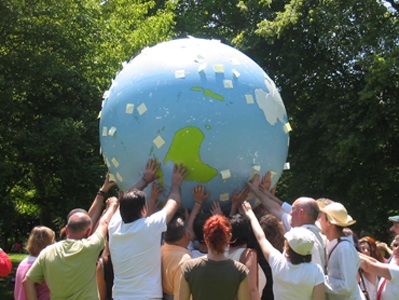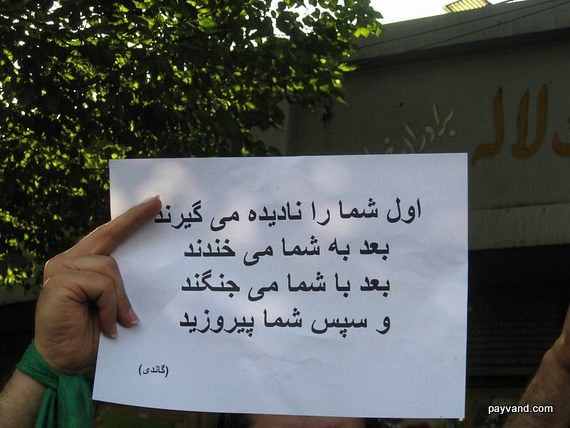|
I have recently been given an assignment. I have been told that if we are to reach people with a message of nonviolence, it is important that each of us, as individual contributors to the Metta family, take the time to share our thoughts and experiences with nonviolence as they rise to our attention, and to share them with readers via the Metta blog. I have been watching for an opportune moment to do this.
This morning, Sunday morning, I found that moment when I read a beautiful note written by Lorin Peters that I am inspired to share. Thus, I begin my blog posting career today with a reminder to myself and to all of us, a reminder that has become a sort of mantram for me of late: be nonviolent to yourself if you are to be nonviolent at all.
Nonviolence is not a mere strategy; it is a life lesson. It is a force that can be found existent within, a philosophy of life that can be learned, practiced, and shared. If we are nonviolent in protests or political campaigns, but violent with ourselves (overwork is a common form of self-inflicted violence!), we are not practicing nonviolence. Please join me in remembering that resting and taking care of oneself is a necessary element of a nonviolent life.
Please read the following through as sacred or as secular a lens as you wish. I am not presenting this as a religious message, but as a human message!
A Sabbath Concern
Lorin Peters
2009 August 9
“The team is now working seven days a week, including Sundays.” This announcement, my first day back on team this year, caught me by surprise. On my previous trips, the whole team took Sundays off and went to church in Jerusalem. The announcement continued, “We each work five days a week, and take two days off.” I was told this new seven days-a-week policy was not requested by our new Palestinian Advisory Council. I would guess it is a product of our refocusing process last winter.
I wonder if this new policy is a good idea. Some teammates have suggested, “Our mission, to reduce violence, is like a nonviolent police function. Police have to be on duty seven days a week.” But we are not the only ones who know how to reduce violence. Palestinians have a long history of nonviolent resistance. And ISM and EAPPI often have teams in Al Khalil (Hebron). Might feeling that ‘the natives can’t survive without us’ be a western, and patronizing, viewpoint?
One of the Ten Commandments says, “Remember the sabbath day and keep it holy.” (Exod 20:8) When Moses announced this, it was to a people who were struggling to survive. Every sabbath became an extra day in the desert. God was in effect saying, “Trust in me. I am in charge here. You will not die because you rested.” Does a day of rest not increase, rather than decrease, our ability to do good work?
Jesus did qualify this; “Suppose one of you has only one sheep and it falls into a pit on the sabbath; will you not lay hold of it and lift it out? How much more valuable is a human being than a sheep? So it is lawful to do good on the sabbath.” (Matt 12: 11-12) It is good to save life on the sabbath. But I do not think he intended that we should walk around looking for sheep, or people, to save every sabbath.
I have spent much time talking with as well as reading Rabbi Michael Lerner. Observing the sabbath is one of his constant messages. No work on the Sabbath. Rest, relax, play, read, reflect, pray, grow, make love, but do no work. I suspect this applies to whole societies as well as to individuals. Is not working seven days a week part of our secular, materialist culture?
Nonviolence often does not “work” in the way we expect or hope it to. But principled nonviolence, which Gandhi and King practiced, from a spiritual ground or center, always works in some deeper or unexpected ways, beyond or outside our understanding (see Michael Nagler, “The Search for a Nonviolent Future”, chapter 4, “Work” Versus Work, pp 87-130). That is the nature, and the beauty, of faithfulness and humility and selflessness. The seed that falls to earth and dies does not know that it will sprout and grow and blossom into a whole new life.
Blessed are the meek, the gentle, the nonviolent;
for they shall inherit the earth.
|











